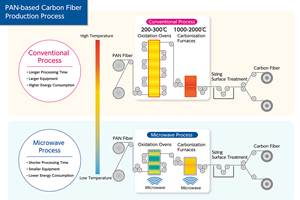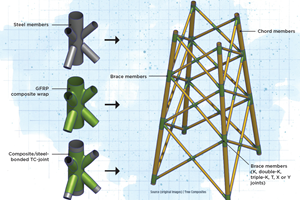Composites UK launches two new programs
Composites UK will officially launch its new sustainability subgroup on October 3rd with an event held at Scott Bader Company Ltd.’s premises. And, the new Composites Technician apprenticeship program, announced September 25, has been approved by the UK government.
Composites UK will officially launch its new sustainability subgroup on October 3rd with an event held at Scott Bader Company Ltd.’s (Northamptonshire, UK) premises on the subject of “A Sustainable Future for Composites.” The subgroup, which is chaired by Steven Brown, polymer development manager AAC and composites at Scott Bader, will incorporate the Association’s bio-composites group, and is the third special interest arm of Composites UK, the others being construction and material suppliers.
Steven Brown says "Scott Bader is delighted to be hosting this launch event for the new sustainability subgroup of Composites UK, since this fits very well with our strategic focus on sustainable development, which we see as a key foundation of our future business. This is a critical subject for the whole composites industry to be giving attention to, and we believe that the creation of this subgroup will help to further raise the profile of sustainability in the UK composites industry."
The aim of the sustainability subgroup is to overcome challenges in fiber-reinforced polymer composite (FRP) recycling, improve disposal methods and supply chains, incorporate more bio-based FRPs into components in the specification stages, including consideration of environmental impact at the design stage as well as understanding the impact of the products produced both to the factory gate and through life. Not least, the group aims to spread good practice in resource and energy efficiency, and structure business models to promote this.
Stella Job, supply chain and environment manager adds “Environmental sustainability has always been on the agenda at Composites UK, but the launch of this group represents a new chapter where we will put in more resources to solve some of the challenges in this area and develop knowledge and good practice to increase the positive environmental impact of composite materials.”
Composites UK is encouraging the composites industry to have its say on what it would like the group to look like in a consulting survey (https://www.surveymonkey.co.uk/r/DV2H685). For further information on the launch event and to register visit https://compositesuk.co.uk/events/sustainable-future-composites. Discounts are available for Composites UK members.
The second program, announced September 25, 2017, is the new Composites Technician apprenticeship. The modular training was developed by an Industrial Steering Group of Small and Medium Enterprises (SMEs) offering employers a new and valuable tool in how they can attract, train and develop talent within their businesses. It is set to make a significant contribution in addressing the skills shortages in Composites using industries.
Dean Jones of Rolls Royce, the Industrial Steering Group Chair, says “The approval by Government of the Composites Technician Apprenticeship is a significant milestone and we can now train apprentices on composites part manufacture making sure the content of the qualification meets the needs of all the industrial sectors manufacturing composites parts”.
The Industrial Steering Group has developed the content of a new BTEC qualification with support from awarding body, Pearsons. The apprenticeship is underway with colleges and training providers delivering the content of the BTEC and the training elements of the NVQ. Companies within the composites industry are already leading the way with their new apprentices starting the program this month. Having eight mandatory units, which include materials, processes, design and defect detection, the training program has been designed to provide the apprentice with a broad understanding of all elements of composites
manufacture. This will enable cross-industry movement of people in the future. In addition, there are 10 optional units which enable the trainee to focus on specific areas and gain a deeper understanding in the specific operations the company requires. The number of the optional units will be increased as industry demand dictates and new processes and materials are developed.
“In the past, companies manufacturing in composite materials have had to train their apprentices in the principles of metallic manufacturing. Now there is a specific apprenticeship program designed and developed by composites manufacturers to address this issue. The government’s commitment to support apprenticeships means that many companies can now train new and existing staff at low or no cost. We constantly hear how skills gaps and shortages are constraining growth and productivity, and how new recruits and even contractors lack the skills to perform required tasks. Well, the new Composites Technician Apprenticeship is set to address this serious issue and as the many sectors which manufacture composites parts is set to grow exponentially, this is welcome news.”
For more information about which colleges are offering the apprenticeship in 2017/18, please contact Brian Thornton, Program Coordinator, at the National Composites Centre: brian.thornton@nccuk.com or visit: https://www.gov.uk/government/publications/apprenticeship-standard-composites-technician.
Related Content
Composites end markets: Electronics (2024)
Increasingly, prototype and production-ready smart devices featuring thermoplastic composite cases and other components provide lightweight, optimized sustainable alternatives to metal.
Read MoreMicrowave heating for more sustainable carbon fiber
Skeptics say it won’t work — Osaka-based Microwave Chemical Co. says it already has — and continues to advance its simulation-based technology to slash energy use and emissions in manufacturing.
Read MoreNatural fiber composites: Growing to fit sustainability needs
Led by global and industry-wide sustainability goals, commercial interest in flax and hemp fiber-reinforced composites grows into higher-performance, higher-volume applications.
Read MoreNovel composite technology replaces welded joints in tubular structures
The Tree Composites TC-joint replaces traditional welding in jacket foundations for offshore wind turbine generator applications, advancing the world’s quest for fast, sustainable energy deployment.
Read MoreRead Next
VIDEO: High-volume processing for fiberglass components
Cannon Ergos, a company specializing in high-ton presses and equipment for composites fabrication and plastics processing, displayed automotive and industrial components at CAMX 2024.
Read MorePlant tour: Daher Shap’in TechCenter and composites production plant, Saint-Aignan-de-Grandlieu, France
Co-located R&D and production advance OOA thermosets, thermoplastics, welding, recycling and digital technologies for faster processing and certification of lighter, more sustainable composites.
Read More“Structured air” TPS safeguards composite structures
Powered by an 85% air/15% pure polyimide aerogel, Blueshift’s novel material system protects structures during transient thermal events from -200°C to beyond 2400°C for rockets, battery boxes and more.
Read More
















.jpg;maxWidth=300;quality=90)







